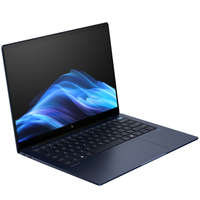HP's latest business-focused laptop blows every competitor out of the water with Qualcomm's latest chips
The EliteBook Ultra G1q combines a thin and light design with Qualcomm's new Snapdragon X Elite to great effect.
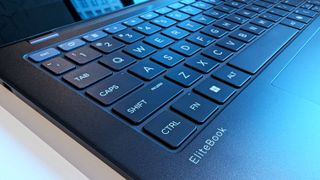
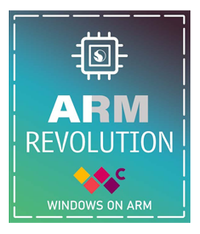
What you need to know
- Today, Microsoft and Windows PC OEM partners are announcing the next generation of ARM-powered, AI-centric Windows laptops.
- HP is no exception, with its new EliteBook Ultra G1q directly targeting businesses with its thin-and-light design and stellar battery life.
- It's a gorgeous, sleek premium laptop with impressive capabilities, and is available to preorder from $1,699.99 at HP ahead of its June 18, 2024 release.
- HP also revealed the OmniBook X 14, the consumer-focused version of the EliteBook Ultra with a lower starting price and more configuration options.
It's a big day for Windows PCs, particularly laptops. Microsoft has partnered with Qualcomm and a ton of various Windows PC manufacturers to unveil the next generation of Windows PCs built around ARM processors and AI features. It's one of the biggest shifts we've seen in Windows computing in decades, and HP has joined the growing list of partners with two initial laptop announcements: the HP OmniBook X 14 and the HP EliteBook Ultra G1q.
We have a separate post for the HP OmniBook X 14 announcement, as well as an explainer on why HP has dumped all its consumer PC brands in favor of reviving the long-dead OmniBook name. For now, let's focus on the HP EliteBook Ultra G1q, and why it's one of the most exciting enterprise laptops we've seen in a long time.
- Check out our in-depth live coverage of the Microsoft Surface and Windows 11 AI event
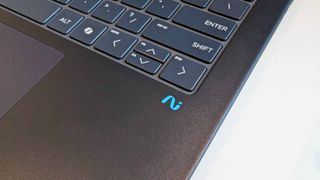
• Price: From $1,699.99 at HP
• Processor: Qualcomm Snapdragon X Elite (12 cores
• GPU: Qualcomm Adreno
• NPU: Qualcomm Hexagon (45 TOPS)
• RAM: 16GB LPDDR5x @ 8,400MHz
• Memory: Up to 1TB M.2 NVMe PCIe Gen 4x4 SSD
• Display: 14-inch White LED, 16:10 aspect ratio, 2.2K (2,240 x 1,400) resolution, 300nits max brightness, touch enabled, Low Blue Light, 100% sRGB color gamut
• Webcam: 5MP w/ IR sensor, Windows Studios & Poly Camera Pro support
• Audio: Dual-array microphones, dual stereo speakers w/ Poly Studio tuning
• Wireless: Up to Qualcomm Fast Connect 7800 Wi-Fi 7, Bluetooth 5.4
• Ports: 2x USB Type-C 3.2 Gen 2 w/ Power Delivery & DisplayPort 1.4a, 1x USB Type-A 3.2 Gen 2 w/ HP Charging, 1x 3.5mm audio jack
• Battery: 59Whr, 65W USB Type-C fast charger
• Dimensions: 312.9 x 223.5 x 14.4-8.5mm (12.32 x 8.8 x 0.56-0.33in)
• Weight: 1.34kg (2.97lbs)
The first thing you're likely to notice about the HP EliteBook Ultra G1q is its distinctive design. The aluminum chassis, made of 50% recycled aluminum, is a shade of blue so dark it's nearly black, with a unique tri-tone keyboard. It's also incredibly thin and light, coming in at a staggeringly slim 8.5-14.4mm and less than 3lbs. On the lid you'll find HP's iconic, minimalist logo, and on the keyboard deck you'll spot the EliteBook branding as well as HP's new blue AI logo reserved for next generation Windows AI PCs.
Once you get past the initial design, you'll soon realize that this isn't your typical Intel or AMD-powered Windows laptop. The EliteBook Ultra G1q is among the very first Windows laptops powered by the new Qualcomm Snapdragon X-series ARM chipsets. More specifically, it boasts the more powerful Snapdragon X Elite with 12 cores and a 45 TOPS neural processing unit (NPU). This all-new ARM platform is what enables the EliteBook Ultra G1q to be as thin and light as it is, without sacrificing the performance or compatibility enterprises need.
This laptop is helping to usher in a new wave of Windows on ARM PCs, which boast significantly more power than ever before. Microsoft has invested a significant amount of work into ensuring Windows 11 (and all of your apps and programs) work seamlessly on the new Snapdragon X chips, so that users can fully benefit from the absurd power and efficiency in laptops more compact than are possible with traditional x86 CPUs. Case in point, HP is quoting up to 26 hours of battery life, tested with continuous video streaming at 200nits display brightness.

Actual real-world usage is bound to affect that battery life, but that's still an incredibly impressive starting point when many laptops struggle even to hit 8-10 hours of continuous video streaming. All of that's on top of having enough power to run all the apps (and even some games, thanks to that potent Adreno GPU), even when using the programs that still aren't compiled for ARM and need to be run through Microsoft's advanced emulation layer.
So, what sets the HP EliteBook Ultra G1q apart from its consumer-friendly OmniBook X sibling? Well, aside from the different chassis color, the EliteBook will have fewer configurations from which to choose and a higher starting price. That's typical of an enterprise laptop, because the trade-off is gaining more advanced security and remote management features. You can get the EliteBook Ultra G1q with Windows 11 Pro, and by default will come equipped with Microsoft Pluton Security and HP's Wolf Pro Security platforms, as well as various HP management applications.
Get the Windows Central Newsletter
All the latest news, reviews, and guides for Windows and Xbox diehards.
Windows on ARM going big in Enterprise with HP
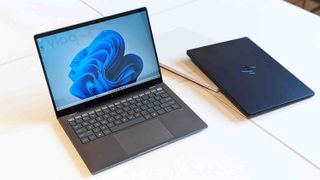
I've been very excited for these new Windows on ARM PCs to arrive with Qualcomm's latest Snapdragon X-series chips, and there are a lot of good reasons for that. In fact, you can check out our Windows on ARM FAQ for more information on the subject. The HP EliteBook Ultra G1q is specifically exciting to me, however, because of its positively gorgeous blue-shaded design. I've long loved HP's laptop design language, and Snapdragon X allows the company to make its laptops even thinner and lighter without compromising on features or endurance.
Specs-wise, though, this isn't the most interesting laptop in the world. You're limited to 16GB of soldered RAM, no matter how fast it is, and the laptop tops out at 1TB of speedy SSD storage. There's also no option for 5G cellular connectivity in this laptop, sadly. It would've been nice to see a USB4 port, too, for faster data transfer speeds and more docking options. Finally, I'm reserving judgement for the quality of the EliteBook Ultra G1q's unique White LED display until I can see it for myself; WLED displays are supposed to be more power efficient, but a max brightness of 300nits isn't what I want to see in a brand-new Windows laptop.
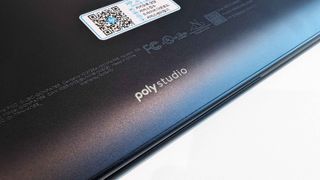
That being said, most people will likely be better served by the HP OmniBook X 14, which shares the exact same foundation as the EliteBook Ultra G1q (and the same Qualcomm Snapdragon X Elite chip), but trades some advanced security and management features for a lower starting price and more configurations. You're also limited to more boring gray or silver colorways, but that's the way of the world.
For the enterprises interested in exploring the next generation of Windows on ARM PCs, which also benefit from exclusive Windows 11 AI features, the HP EliteBook Ultra G1q has everything it needs to be one of the best Windows on ARM PCs you can buy. It shows every sign of being powerful, efficient, and capable enough to smash any task you throw at it, on top of being so portable it'll disappear in a bag.
The HP EliteBook Ultra G1q is available to preorder now from $1,699.99 at HP, and is expected to release on June 18, 2024.
Explaining AI PCs and Copilot+

Previously, AI PCs were defined by Windows 11, the presence of an NPU, and a dedicated key for Windows Copilot on the keyboard. This meant Windows PCs powered by Intel Core Ultra or the latest generation of AMD Ryzen CPUs, often accompanied by manufacturer-specific AI features or applications. However, the new generation of Windows on ARM PCs ushers in an equally new generation of AI features for the Windows ecosystem, which Microsoft is dubbing Copilot+.
Unlike current AI PCs, Copilot Plus requires an NPU capable of at least 45 tera operations per second (TOPS), which neither Intel Core Ultra nor AMD Ryzen can approach in their current iteration. Qualcomm's Snapdragon X-series of chips are the first on the market with 45 TOPS NPUs, meaning the next-gen Copilot+ Windows 11 is exclusive to these Windows on ARM PCs until Intel and AMD catch up (expected later this year).
So, what do these new NPUs enable? Well, brand-new Windows 11 features like Recall and Auto Super Resolution, as well as upgraded versions of Live Caption translations, Cocreator image and text generation, and Windows Studio effects. Copilot+ PCs also enable new AI features from manufacturers, such as HP's new AI Companion app for its OmniBook X 14 and EliteBook Ultra G1q. All of this, and much of it can be done on-device now, without relying on the cloud for processing.
Recall offers an advanced timeline of everything you do on your Windows PC, accessible with natural language — Return to any previous task, bring up any information or file with a query, and compare and contrast different data in moments. Live Caption can translate over 40 languages in real time, Cocreator can now generate more advanced text and images on-device, and Windows Studio can further improve your video and audio recording. It's all very impressive, and for now Windows Copilot+ PCs is synonymous with Qualcomm Snapdragon X Windows on ARM PCs.
HP EliteBook Ultra G1q — From $1,699.99 at HP
For the forward-thinking businesspeople, the EliteBook Ultra G1q is thin, light, powerful, efficient, and swimming in an assortment of advanced AI features. It's part of the first wave of a new generation of Windows PC.
Also see: HP OmniBook X 14 from $1,199.99 at HP

Zachary Boddy (They / Them) is a Staff Writer for Windows Central, primarily focused on covering the latest news in tech and gaming, the best Xbox and PC games, and the most interesting Windows and Xbox hardware. They have been gaming and writing for most of their life starting with the original Xbox, and started out as a freelancer for Windows Central and its sister sites in 2019. Now a full-fledged Staff Writer, Zachary has expanded from only writing about all things Minecraft to covering practically everything on which Windows Central is an expert, especially when it comes to Microsoft. You can find Zachary on Twitter @BoddyZachary.
